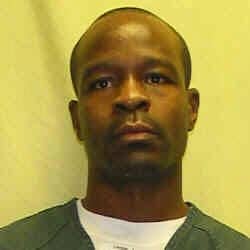Chief William A. Eleby, Bureau of Classification, Ohio Department of Rehabilitation at:
Delegation to present Warden David Bobby’s representative with letter of support for the hunger strikers with hundreds of signatures
by Sharon Danann, Lucasville Uprising Freedom Network
 [1]
[1] This is the Ohio State Penitentiary, where supporters of the Lucasville prisoners on hunger strike will rally tomorrow, Saturday, Jan. 15, on Dr. Martin Luther King’s birthday
Three inmates on death row at Ohio State Penitentiary have been on hunger strike since Monday, Jan.3, to protest the conditions of their confinement. All three prisoners received death sentences following the rebellion in the Southern Ohio Correctional Facility in Lucasville, Ohio, and have been held at the highest security level, Level 5, since they were transferred to OSP In 1998.
The hunger strikers, Keith LaMar, Siddique Abdullah Hasan (Carlos Sanders) and Jason Robb are simply asking that they be treated like other death row prisoners. A fourth prisoner, Namir Abdul Mateen (James Were), may join the hunger strike as his health permits. Other prisoners at OSP may go on hunger strike on Jan. 15 to show their support for the hunger strike in progress.
Robb has pointed out that other prisoners from the Lucasville disturbance have been transferred out of OSP or have had their security levels reduced so that they are not suffering the extreme restrictions of Level 5. In the words of LaMar, also known by his chosen name, Bomani Hondo Shakur:
“We have undergone penalty on top of penalty, kept from fully participating in our appeals, from touching our friends and families, denied adequate medical treatment, and so many other things that are too numerous to name. In a word, we have been tortured. And, yes, I’m aware that the word ‘tortured’ is a strong word to use, but I know of no other word that more adequately describes what we have been through. We have been put through hell.”
An “Open Letter” has been circulating and has collected more than 1,200 signatures (see below). In the sampling of the first 100 names, it can be seen that the prisoners have support from Ohio, many other states and all across the globe, among them many prominent citizens. After the participants in the rally have had the opportunity to add their names to the list, a delegation of friends and family members of the hunger strikers will proceed to OSP to present the signed letter to Warden David Bobby’s designated representative. Youngstown attorney Staughton Lynd is available to answer questions about the “Open Letter” at (330) 652-9635.
Supporters are driving in from other states and from several Ohio cities to participate in the rally at the gates of OSP. Family members of the hunger strikers will be in attendance. Messages of solidarity will be read that are coming in from across the country and around the world. In particular, people in Ireland are remembering the tragic deaths of 10 prisoners who went on hunger strike thirty years ago and are sending words of understanding and support.
The location for Saturday’s event is 878 Coitsville-Hubbard Rd., Youngstown, Ohio. The rally and press conference is a joint effort of the Youngstown-based prisoner-advocacy organization, LOOP (Loved Ones Of Prisoners), the Lucasville Uprising Freedom Network and the Cleveland chapter of the New Black Panther Party.
Contact Sharon Danann and the Lucasville Uprising Freedom Network at (216) 571-2518 lucasvillefreedom@gmail.com [2].
---------------------------------------------
Open letter to Ohio prison officials on behalf of the Lucasville prisoners on hunger strike
To: Warden David Bobby, Ohio State Penitentiary; Director Gary Mohr, Ohio Department of Rehabilitation and Correction; and Chief William A. Eleby, Bureau of Classification, Ohio Department of Rehabilitation
We the undersigned call for an end to isolated “supermax” imprisonment in Ohio State Penitentiary. We are especially concerned about the cases of Siddique Abdullah Hasan (Carlos Sanders), Bomani Shakur (Keith LaMar), Jason Robb and Namir Abdul Mateen (James Were), who are on hunger strike in protest against their conditions of confinement. We understand that they have taken this course of action out of total frustration with their hopeless situation at OSP (Ohio State Penitentiary).
These men have been kept in isolation continuously since they were sentenced to death for their alleged roles in the 11-day rebellion at the Southern Ohio Correctional Facility (SOCF) in Lucasville, Ohio, in April 1993. Hasan and Robb were two of the three men who negotiated a peaceful surrender in that rebellion and their actions undoubtedly saved lives.
Throughout their more than 17 years of solitary confinement, these four men have been subjected to harsher conditions than the more than 150 other men sentenced to death in Ohio. The conditions under which they are confined prevent them from ever being in the same space as another prisoner. Judge James Gwin of federal district court noted with amazement during the trial of the prisoners’ class action, Austin v. Wilkinson, that death-sentenced prisoners at the highest security level in the Ohio State Penitentiary wanted to be returned to Death Row!
The four have suffered Level 5 top security isolation since OSP was opened in 1998. This essentially means that they live in 23-hour lockup in a hermetically sealed environment where they have almost no contact with other living beings – human, animal or plant. When released from their cells for short periods of “recreation,” they continue to be isolated from others. During occasional visits, a wall of bullet-proof glass separates them from their visitors. They remain shackled, despite the fact that they could do no harm in these secure spaces. A few booths away, condemned men from death row sit in cubicles where a small hole is cut from the security glass between them and their visitors. They can hold their mother’s hand. With a little effort, they can kiss a niece or a grandchild. They do not have to shout to hold a conversation.
Hasan, LaMar, Robb and Were experience annual “security reviews,” but their outcome is predetermined. The prison authorities have told them, in writing:
“You were admitted to OSP in May of 1998. We are of the opinion that your placement offense is so severe that you should remain at the OSP permanently or for many years regardless of your behavior while confined at the OSP.”
The lack of a meaningful review violates the due process clause of the Fifth Amendment of the U.S. Constitution. Keeping men in supermax isolation for long periods clearly violates the Eighth Amendment prohibition of cruel and unusual punishment. Moreover, the emphasized words above directly violate the explicit instruction of the Supreme Court of the United States in Wilkinson v. Austin.
These men are being held in solitary confinement permanently, until they are put to death by Ohio or their convictions reversed. This is not simply long-term solitary confinement, but in essence permanent solitary confinement.
Other prisoners sentenced to death for alleged crimes comparable to or worse than those for which Hasan, LaMar, Robb and Were were found guilty have been moved off of Level 5 – to Death Row, to Level 4 at OSP and out of OSP entirely. One of the four Lucasville defendants asks, “Must I have a mental breakdown in order to get off Level 5?”
We demand that the Ohio prison authorities remove these four men from Level 5 “supermax” security and that they end the cruel practice of long-term isolated confinement.
Signed by:
Jules Lobel, Vice President, Center for Constitutional Rights, Professor of Law, University of Pittsburgh
Christine Link, Executive Director, ACLU of Ohio
Noam Chomsky, Massachusetts Institute of Technology
David Goldberger, Professor Emeritus of Law, Ohio State University
Barbara Ehrenreich, author, academic, activist
Mike Ferner, National President, Veterans for Peace
Immanuel Wallerstein, academic and writer
Boaventura de Sousa Santos, University of Coimbra, Distinguished Legal Scholar, University of Wisconsin
Edward S. Herman, Wharton School, University of Pennsylvania
Professor Gabriel Palmer-Fernandez, Director, Dr. James Dale Ethics Center, Youngstown State University
Andrej Grubacic, author and lecturer at San Francisco Art Institute
Peter Linebaugh, historian, University of Toledo, Ohio
Michael Albert, founder, Znet
Professor Thomas Mathiesen, KROM, The Norwegian Association for Penal Reform, Oslo, Norway
Jana Schroeder, Former Director, American Friends Service Committee Ohio Criminal Justice Program
Jesse Lemisch, Professor of History Emeritus, John Jay College of Criminal Justice, CUNY
Denis O’Hearn, Professor of Sociology, Binghamton University, SUNY
Ellen Kitchens, CURE-Ohio, Inc.
Christian G. De Vito, Associazione Liberarsi, Italy
Lorry Swain, migrant rights activist, Ohio
Robert W. McChesney, Gutgsell Endowed Professor, University of Illinois at Urbana, Champaign
Jason Jaffery, Development Director, ACLU of Ohio Foundation
Kathie Izor, Colorado CURE Board
Raj Patel, author and scholar
Katherine Soltis, Chair, Cleveland Coalition Against the Death Penalty
Ioanna Drosou, Greek Initiative for Prisoners’ Rights
Immanuel Ness, CUNY, Editor, Working USA
Ron Keine, Assistant Director, Witness to Innocence
Carlos Ivan Ramos, Ph.D., Executive Director, Hispanic UMADAOP, Cleveland
Michael Parenti, author and scholar
Veronica Dahlberg, Board Member, ACLU Cleveland Chapter
Professor Phil Scraton, Law School, Queens University, Belfast
Sam Bahour, Management Consultant, West Bank, Palestine
Bob Fitrakis, Editor, Free Press, Columbus, Ohio
Faye Harrison, Southern Human Rights Organizers’ Network
Reverend Dorsey R. Stebbins, Cincinnati, Ohio
Herbert P. Bix, Pulitzer Prize-winning historian, SUNY, Binghamton
John Polanski, ordained minister, Mineral Ridge, Ohio
Judith Stanger, retired teacher, Boardman, Ohio
James Gilligan, M.D., Professor of Psychiatry and Law, New York University
James E. Ray, ordained minister, Poland, Ohio
Marcus Rediker, Historian, University of Pittsburgh
John Stoffer, Elder of Presbyterian Church, Salem, Ohio
Kathleen McGarry, attorney, New Mexico
Mary Ann Meaker, Ohioans to Stop Executions
Paulette F Dauteuil, The Jericho Movement for PP’s/POW
Sarah L. Duncan, retired teacher, Vienna, Ohio
Fr. Joseph E. Mulligan, S.J., Nicaragua
Jim Jordan, assistant for autistic children, Vienna, Ohio
Joe Lombardo, co-coordinator, United National Antiwar Committee, UNAC
Andrew Lee Feight, Associate Professor of History, Shawnee State University
Jane Stoffer, retired drug counselor, Salem, Ohio
Margaret J Plews, Arizona Prison Watch
Peter Rachleff, Professor of History, Macalester College, Saint Paul, Minnesota
Lynn Thompson Bryant, Presbyterian pastor, Akron, Ohio
And more than 1,100 others.
Related Posts


























